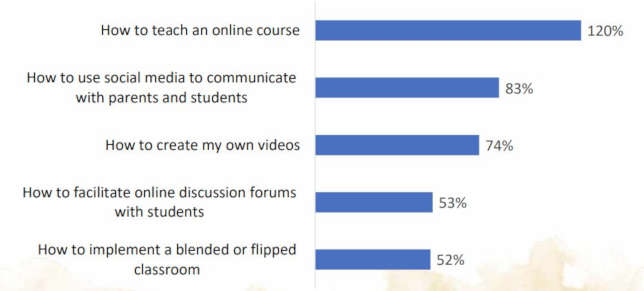The Pandemic's Impact on Teacher, Parent and Student Attitudes
- By Dian Schaffhauser
- 10/26/20
Interest
by teachers in professional development on how to teach online
courses more than doubled when the pandemic arrived, by 120 percent.
Interest in PD on the use of social media to communicate with parents
and students grew by 83 percent. And interest in how to create videos
jumped by 74 percent. Also popular: PD on how to facilitate online
discussion forums (53 percent) and implement a blended or flipped
class (52 percent).
On
the student side, while just a quarter of middle graders reported
using texting to communicate with teachers before mid-March, when
schools began to close, that grew to 62 percent during school
closures. Usage of texting to teachers among students in grades 9-12
also grew, from 38 percent to 69 percent.

The
percentage increase in teachers who want professional development as a result of remote instruction. Source: Project
Tomorrow's
"Speak Up 2020 Congressional Briefing: Release of the National Research Findings"
These
results came from a cut of data collected and analyzed by Project
Tomorrow,
an education nonprofit that runs the on-going Speak
Up Research Project.
The latest data compared responses from 137,000 K-12 stakeholders,
including students, parents, teachers and site and district leaders
collected before school closures (September 2019 to Mar. 16, 2020)
and during (between Mar. 16 2020 and Jun. 30, 2020).
Schools
that participate in the free national survey project receive summary
reports with local, state and national results for their own
benchmarking.
Among
the other findings were these:
-
Parents
expressed a greater appreciation for technology in education and its
use by teachers. Three-quarters reported that the effective use of
tech in school was "very important" for their child's
future success, compared to 55 percent before the school closures.
And while a third of parents (32 percent) agreed that tech was used
effectively by their children's teachers to support learning before
the school closures, that rose to 51 percent during the closures.
-
Usage
of school-provided Chromebooks by students shot up when schools
closed in the spring. For students in grades 3-5, the increase was
32 percentage points (from 50 percent to 82 percent); for students
in grades 6-8, usage went from 56 percent to 80 percent; and for
high schoolers usage increased from 35 percent to 65 percent.
"By
examining Speak Up results from before and after school closures, we
are able to see in almost real time how the unexpected shift has
altered not only teachers' expectations for using technology within
learning, but also parents' perceptions on the value of digital
learning and the impact of this experience on students' aspirations
for enhanced learning environments," said Julie Evans,
researcher and CEO of Project Tomorrow, in a statement.
A
recorded presentation on the results that included commentary by
students, as well as access to slides and a continuing education
certificate is available through edWeb.net,
with free registration. In the archive
list,
look for "Speak Up 2020 Congressional Briefing: Release of the
National Research Findings."
About the Author
Dian Schaffhauser is a former senior contributing editor for 1105 Media's education publications THE Journal, Campus Technology and Spaces4Learning.